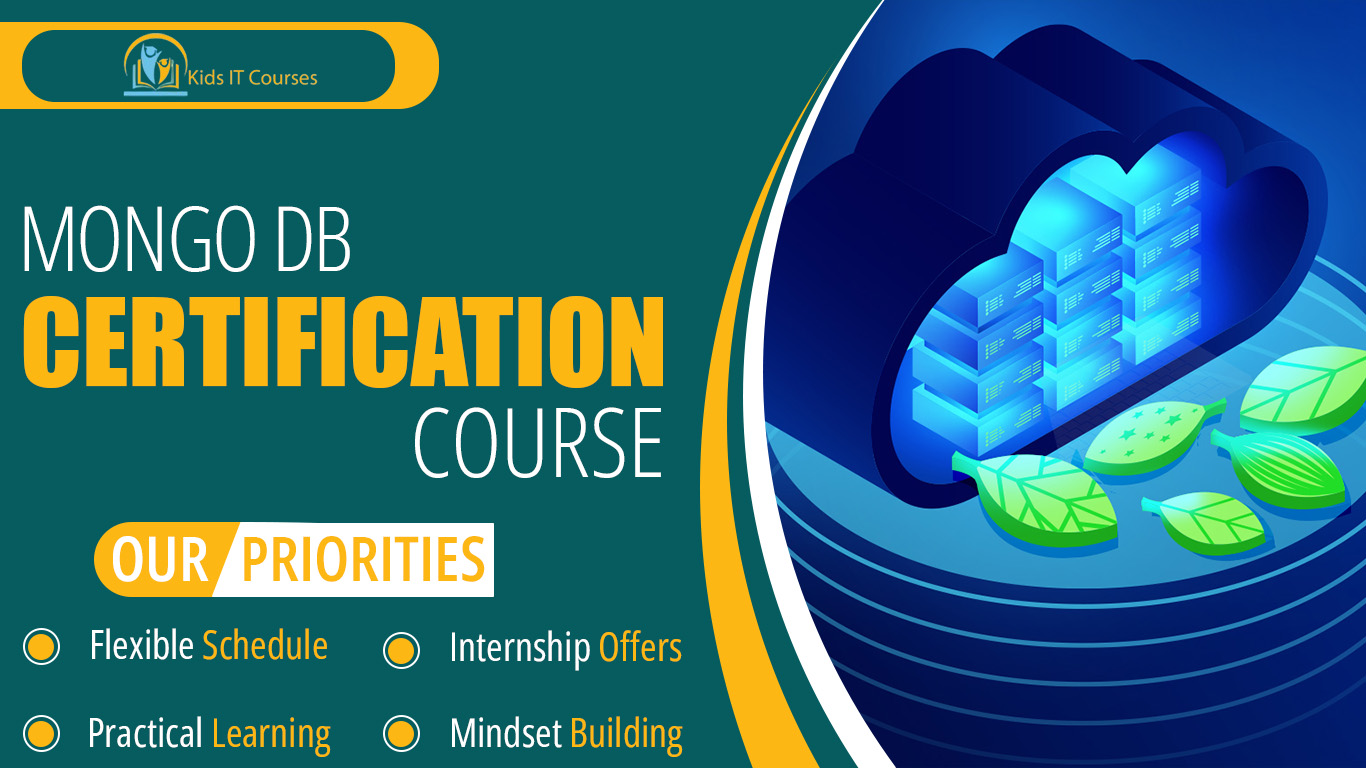
MongoDB Course for Kids
Definition
• MongoDB is a database that saves data in a flexible format. It works like storing information in folders with notes.
• Instead of tables like in school, kids use boxes (called documents). Each box holds related data.
• Kids can save names, games, scores, and more. It feels like building their own mini website brain.
• MongoDB doesn’t need too many rules to save data. Kids can focus on creativity and ideas.
• Using MongoDB helps kids plan and organize better. They learn to group things smartly.
• Famous apps like Facebook and Uber use MongoDB. So kids get future-ready skills early.
• MongoDB fits easily with Python, JavaScript, and more. Kids can use it in games, apps, or websites they build.
Mongo DB | Students Physical Classes Nearby Rawalpindi
Importance
• MongoDB helps kids save data like a digital notebook. It’s easy and fun to use.
• Kids learn how to keep information neat and tidy. Everything goes into collections and documents.
• MongoDB is quick and can handle lots of data. Kids learn how fast websites save and show data.
• It helps kids understand how apps store and find things. This builds their logic and problem-solving.
• Many games, apps, and websites use MongoDB. Kids learn skills that are useful in real life.
• Kids can use MongoDB with languages like JavaScript. It helps them make full apps and games.
• With fun examples, kids enjoy learning about data. It makes tech feel simple and creative.
Advantages for Freelancing
• MongoDB helps kids store data like names, games, or scores. It saves information in easy-to-understand boxes called documents.
• It’s easier than some other databases. Kids don’t need to write long, tricky code.
• MongoDB is super quick and can handle lots of data. It helps kids make fast apps or games.
• Kids can use MongoDB to save game scores or user info. It’s perfect for app building fun.
• Big companies use MongoDB. Kids learn real-world skills early.
• Unlike other databases, it doesn’t use hard tables. Everything is saved in a clean and simple style.
• Learning MongoDB gives kids a big head start. They become more confident with technology.
Session 1 : What is MongoDB?
Introduction to MongoDB as a NoSQL database
Real-life example: Storing blog posts or user profiles in a flexible database
Key differences between SQL and NoSQL databases
Installing MongoDB and setting up a local database
Activity: Create your first MongoDB database and collection
Session 2 : Basic MongoDB Operations
Understanding CRUD operations: Create, Read, Update, Delete
Real-life example: Adding, retrieving, and updating user data
Using MongoDB’s shell to interact with the database
Activity: Add some data to a collection and retrieve it using queries
Session 3 : Data Modeling in MongoDB
Designing schemas and collections for MongoDB
Real-life example: Structuring data for an online store or blog
Using embedded documents and references for data relationships
Activity: Create a database schema for an e-commerce site
Session 4 : Querying Data in MongoDB
Writing basic and advanced queries in MongoDB
Using operators like
$gt,$lt,$in, and$andfor filtering dataReal-life example: Searching products by price range or customer reviews
Activity: Write queries to retrieve data based on conditions
Session 5 : Indexing and Performance Optimization
Understanding indexes in MongoDB and their role in performance
How to create and manage indexes for faster queries
Real-life example: Speeding up search queries for a large dataset
Activity: Create an index and compare query performance before and after
Session 6 : Aggregation Framework
Introduction to MongoDB’s aggregation framework
Using operators like
$group,$match,$sortto process dataReal-life example: Generating reports or statistics from raw data
Activity: Use aggregation to calculate the average price of products
Session 7 : Data Validation and Security
Validating data before insertion with MongoDB’s schema validation
Real-life example: Ensuring that all user data is valid and consistent
Basic authentication and securing MongoDB connections
Activity: Set up validation rules and user authentication in MongoDB
Session 8 : MongoDB in Real-World Applications
Integrating MongoDB with web and mobile applications (Node.js, Express)
Using MongoDB in production environments with cloud services like Atlas
Real-life example: Storing and managing data for a social media app
Activity: Build a simple app that uses MongoDB for storing user data
Bonus Materials
MongoDB cheat sheet and query guide
Mini projects: To-do list app, blog site backend, inventory management
Free MongoDB cloud resources (MongoDB Atlas)
Certificate of Completion for MongoDB Mastery
